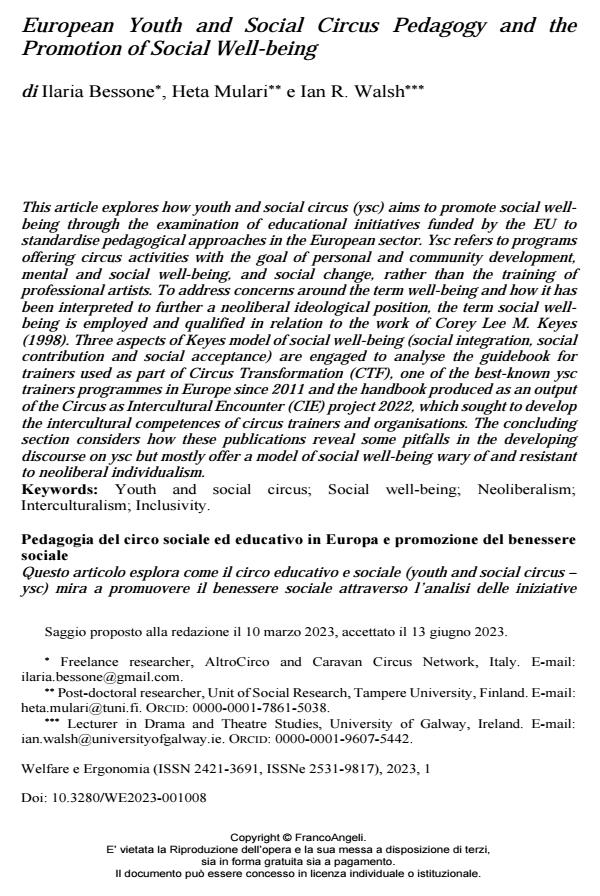European Youth and Social Circus Pedagogy and the Promotion of Social Well-being
Titolo Rivista WELFARE E ERGONOMIA
Autori/Curatori Ilaria Bessone, Heta Mulari, Ian R. Walsh
Anno di pubblicazione 2023 Fascicolo 2023/1
Lingua Inglese Numero pagine 11 P. 97-107 Dimensione file 319 KB
DOI 10.3280/WE2023-001008
Il DOI è il codice a barre della proprietà intellettuale: per saperne di più
clicca qui
Qui sotto puoi vedere in anteprima la prima pagina di questo articolo.
Se questo articolo ti interessa, lo puoi acquistare (e scaricare in formato pdf) seguendo le facili indicazioni per acquistare il download credit. Acquista Download Credits per scaricare questo Articolo in formato PDF

FrancoAngeli è membro della Publishers International Linking Association, Inc (PILA), associazione indipendente e non profit per facilitare (attraverso i servizi tecnologici implementati da CrossRef.org) l’accesso degli studiosi ai contenuti digitali nelle pubblicazioni professionali e scientifiche.
This article explores how youth and social circus (ysc) aims to promote social well-being through the examination of educational initiatives funded by the EU to standardise pedagogical approaches in the European sector. Ysc refers to programs offering circus activities with the goal of personal and community development, mental and social well-being, and social change, rather than the training of professional artists. To address concerns around the term well-being and how it has been interpreted to further a neoliberal ideological position, the term social well-being is employed and qualified in relation to the work of Corey Lee M. Keyes (1998). Three aspects of Keyes model of social well-being (social integration, social contribution and social acceptance) are engaged to analyse the guidebook for trainers used as part of Circus Transformation (CTF), one of the best-known ysc trainers programmes in Europe since 2011 and the handbook produced as an output of the Circus as Intercultural Encounter (CIE) project 2022, which sought to develop the intercultural competences of circus trainers and organisations. The concluding section considers how these publications reveal some pitfalls in the developing discourse on ysc but mostly offer a model of social well-being wary of and resistant to neoliberal individualism.
Questo articolo esplora come il circo educativo e sociale (youth and social circus – ysc) mira a promuovere il benessere sociale attraverso l’analisi delle iniziative educative finanziate dall’UE per standardizzare gli approcci pedagogici in Europa. Ysc si riferisce a programmi che offrono attività circensi con obiettivi di sviluppo personale e comunitario, benessere mentale e sociale e cambiamento sociale, piuttosto che la formazione di artisti professionisti. Per affrontare le preoccupazioni relative al termine benessere e al modo in cui è stato interpretato per favorire una posizione ideologica neoliberista, il termine benessere sociale è impiegato e qualificato in relazione al lavoro di Corey Lee M. Keyes (1998). Tre aspetti del modello di benessere sociale di Keyes (integrazione sociale, contributo sociale e accettazione sociale) sono stati presi in esame per analizzare il manuale per formatori utilizzato nell’ambito di Circus Transformation (CTF), uno dei pro-grammi per formatori ysc più noti in Europa dal 2011 e il manuale prodotto come output del progetto Circus as Intercultural Encounter (CIE) 2022, che ha cercato di sviluppare le competenze interculturali di formatori e organizzazioni circensi. La sezione conclusiva considera come queste pubblicazioni rivelino alcune insidie nello sviluppo del discorso su ysc, ma soprattutto offrano un modello di benessere sociale discordante con e resistente all’individualismo neoliberista.
Parole chiave:Circo educativo e sociale; Benessere sociale; Neoliberismo; Interculturalismo; Inclusività.
- ‘Soft Rebellion’: Flow art, critical play, and wellbeing in the city Heta Mulari, Maaria Hartman, in DIY, Alternative Cultures & Society /2024 pp.296
DOI: 10.1177/27538702241276230
Ilaria Bessone, Heta Mulari, Ian R. Walsh, European Youth and Social Circus Pedagogy and the Promotion of Social Well-being in "WELFARE E ERGONOMIA" 1/2023, pp 97-107, DOI: 10.3280/WE2023-001008